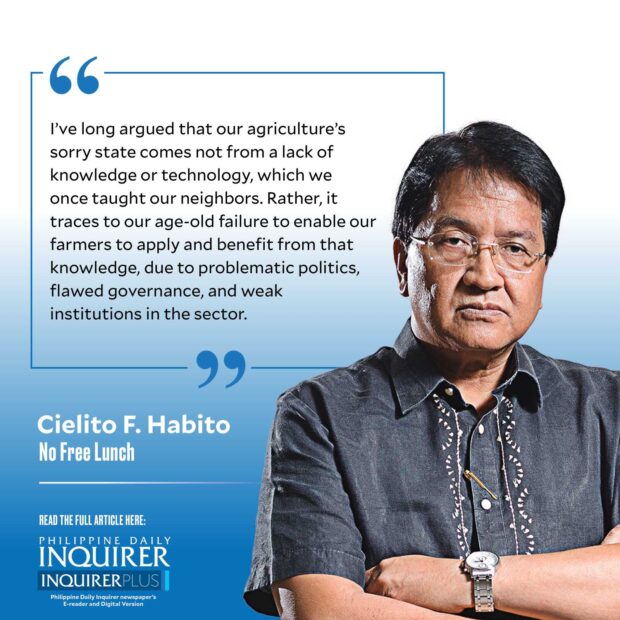Seven-point agriculture agenda

Shortly before the Marcos administration began, I wrote of “seven deadly sins” in the historically flawed governance of our agriculture sector, our economy’s backbone (”Seven deadly sins,” 6/14/22). I’ve long argued that our agriculture’s sorry state comes not from a lack of knowledge or technology, which we once taught our neighbors. Rather, it traces to our age-old failure to enable our farmers to apply and benefit from that knowledge, due to problematic politics, flawed governance, and weak institutions in the sector. I shared these thoughts in a private meeting with Department of Agriculture (DA) Secretary Francis Tiu Laurel Jr., who asked me to elaborate on how to undo the seven sins. Of course, I have no illusions that my advice has taken any precedence over that of countless others, knowing that I am but one in a cacophony of voices constantly feeding advice, solicited or not, to the good secretary.
Those seven sins logically lead to a seven-point agenda, outlined here. Some may not agree with all of them, but I plan to revisit them when this administration ends in 2028, to see what has been done, and assess any significant improvements achieved.
One, let provinces lead in managing their farms and fisheries, to reverse the sin of persistent top-down management of the sector despite mandated devolution since 1991. To its credit, the previous administration already rolled out a long overdue province-led agriculture and fisheries extension system or Pafes. For it to work, the DA must limit itself to “steering,” but take full responsibility for capacitating the provinces for the “rowing,” including downloading much of its budget to them as matching grants.
Article continues after this advertisementTwo, consolidate management of small farms into efficient production units, to correct the sin of failure to address loss of economies of scale from farm fragmentation. A Bureau of Agri-Industry and Cooperatives Development must be reestablished in the DA. Congress must lift land ownership ceilings for agri-business investors, who must be attracted with appropriate incentives. Contract growing must be fostered in a wider variety of farm and fishery products like in Thailand, and LGUs must provide longer and more secure leases for aquaculture investors.
Three, pursue maximum productivity in our rice lands (and all croplands), but help farmers in marginal rice lands shift to better-suited crops that will raise their incomes. The sin of undue obsession with full rice self-sufficiency only brought us farther from it as it was pursued through excessive trade controls that bred complacency from keeping productivity and cost competitive with our neighbors. Worse, it led to neglect of other crops, which received far less attention and budget.
Four, look at the entire value chain and overcome the sin of inordinate focus on production, rather than farmers’ and fishers’ incomes and welfare. Empower farmers and fishers to reap gains from value-adding through participation in transport/logistics and processing via coops. Foster local and foreign investments in agri-based industries and rural transport and logistics via DA’s Agri-Industry Business Corridors program.
Article continues after this advertisementFive, shift to a function-based structure and budget, away from the traditional commodity-based orientation that proved inefficient, ineffective, and distortive. Recast DA to focus on its central “steering” functions: standards setting; integrated research for development and extension (R4DE); monitoring and evaluation; regulation that is science-based and separate from developmental functions; international relations; and most critically, capacity building for local government units.
Six, pursue greater trade openness to reverse the sin of excessive trade protection that removed pressure for both government and producers to pursue higher productivity and competitiveness with our neighbors—and moved up our prices further away from theirs over time. Use transparent tariffs, not trade controls, to provide calibrated protection for domestic producers, while opening trade to wider players to forestall capture by cartels. Ensure that sanitary and phytosanitary requirements are science-based and not used as undue trade barriers.
Seven, and possibly most crucial, make financing widely accessible to small farmers and fishers. Study how Thailand and South Korea did it in conjunction with cooperative development. Work with Congress to change regulatory metrics applied to Landbank (and the Development Bank of the Philippines) to let them focus primarily on their mission to finance small farms (and firms). Foster application of innovative financial technologies for small farmers and fishers.
We can’t fix Philippine agriculture with tired old approaches that never worked, or by adding more wheels to a defective vehicle moving in the wrong direction.
cielito.habito@gmail.com
















